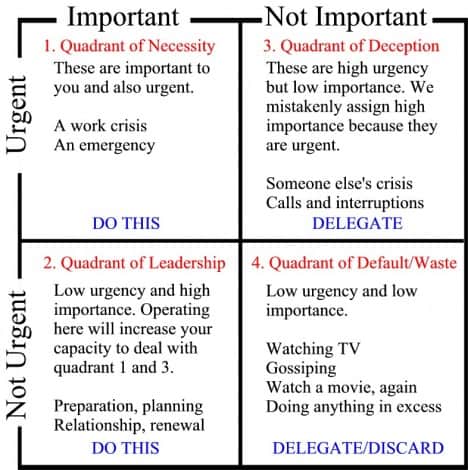
Yet most engineers I know today spend the mornings checking e-mail, making phone calls, or participating in unproductive meetings. I understand, because this is what I did as an engineer. Now, I am not trying to compare engineers to writers—the workplace settings are certainly different—but my goal in this post is to give you a strategy to be more productive in the morning and subsequently overall in your approach.
Your Preparation
At the end of the day, take 15 minutes to review your to-do list and prioritize your tasks. I recommend using Steven Covey’s time-management matrix, which classifies tasks based on importance and urgency (see photo). I have written in the past about identifying your most important tasks (MITs) and many other posts related to productivity; these will most likely be your important/urgent tasks.

Once you have this list, do two things:
1 – Identify the tasks that can be delegated.
2 – Identify one to three tasks that you plan on accomplishing the next morning.
When doing these two steps, assume that your day will end at lunchtime and you will only get about four hours to work on the selected tasks. By doing this each day, you will be prepared to have a super-productive following morning.
How to Start Your Day
When you get into your office in the morning, immediately review your task list. First, delegate the tasks that can be delegated, or at least prepare the tasks for delegation by readying any materials you will need to give the assignee. Next, jump into your first MIT. DO NOT CHECK YOUR E-MAIL. In fact, do not even OPEN your e-mail for as long as possible. Even if that’s just 30 minutes.
Put as much energy as you can into your MITs all morning, guarding your time like a lioness protects the lives of her cubs. Push all meetings to the afternoon if possible. Deflect all calls to the afternoon as much as is practicable. Get into the habit of using this morning time to be productive. Remember, your day ends at noon, right?
Then, after taking this approach all morning, take a lunch break and try to remove yourself from work for at least 30 minutes. Maybe even take a walk. Then come back and evaluate your progress. If need be, continue to work on your MITs or engage in some of the more tedious or less urgent matters. Afternoons can be great for processing e-mails, getting on LinkedIn, making phone calls, having meetings, etc. If you develop this habit of prioritizing and holding the morning hours as sacred, you will dramatically increase your productivity. Remember, increasing productivity doesn’t always mean working more or producing more—it means focusing on important/high-impact tasks.
I hope this post helps you be more productive and less stressed in your engineering career. Please leave comments below with any strategies that you have found to help you prioritize your tasks. Comments are welcome and encouraged!
[widgets_on_pages id=”TECC Free Resources”]To your success,
Anthony Fasano, PE, LEED AP
Engineering Management Institute
Author of Engineer Your Own Success






